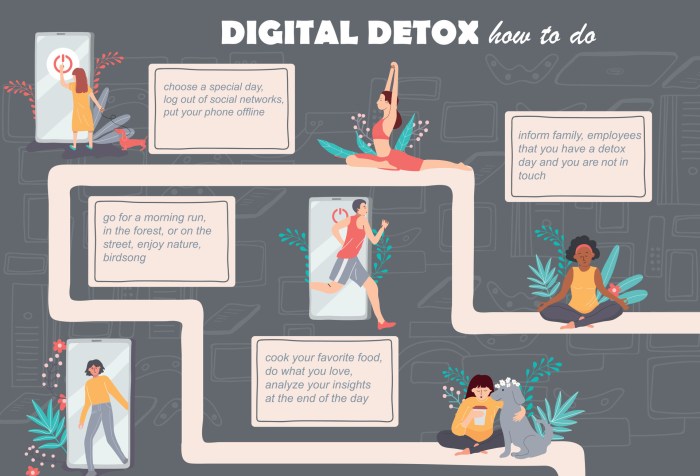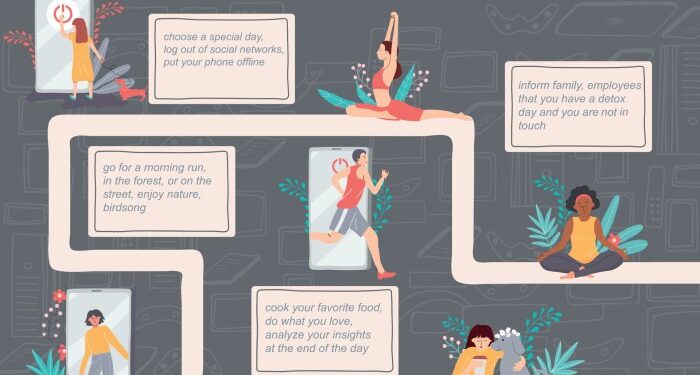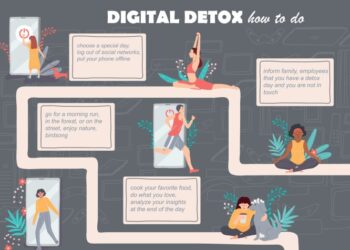Embark on a journey into the realm of digital detox with our topic, 'Digital Detox: Why Your Digilife Needs a Break.' This exploration aims to shed light on the importance of taking a step back from our digital devices in today's fast-paced world.
Delve deeper into the signs, benefits, and tips associated with digital detox to uncover a new perspective on maintaining a healthy balance with technology.
Introduction to Digital Detox
A digital detox refers to taking a break from digital devices such as smartphones, laptops, and tablets to reduce stress, improve focus, and reconnect with the physical world.
It is important to take a break from digital devices because excessive screen time has been linked to various mental health issues such as anxiety, depression, and insomnia. Constant exposure to screens can lead to a decrease in productivity, disrupted sleep patterns, and a negative impact on overall well-being.
Statistics on Screen Time and Mental Health
- On average, adults spend over 11 hours a day interacting with media, including screen time on devices.
- Studies have shown that heavy smartphone use is associated with increased stress levels and symptoms of anxiety.
- Excessive screen time before bedtime can disrupt sleep patterns and lead to poor quality sleep, affecting overall mental health.
- Reducing screen time and taking regular digital detoxes have been shown to improve focus, reduce stress levels, and enhance overall well-being.
Signs You Need a Digital Detox
In today's digital age, it's easy to get caught up in the endless scroll of social media, constant notifications, and overall screen time. Here are some common signs that indicate you may need a digital detox:
Physical and Mental Symptoms of Excessive Screen Time
- Eye strain and headaches from staring at screens for extended periods.
- Neck and back pain due to poor posture while using devices.
- Insomnia or disrupted sleep patterns caused by late-night screen use.
- Anxiety, stress, or irritability when unable to access devices or social media.
Impact on Productivity
Excessive digital consumption can significantly affect your productivity in various ways:
- Decreased focus and concentration on tasks due to constant distractions from notifications.
- Procrastination and time-wasting on social media or entertainment platforms.
- Difficulty in setting boundaries between work and personal life, leading to burnout.
- Reduced creativity and problem-solving skills as a result of over-reliance on digital tools.
Benefits of a Digital Detox

Taking a break from digital devices can have numerous advantages for both our mental and physical well-being. By disconnecting from screens, individuals can experience a range of benefits that positively impact their overall quality of life.
Improved Focus and Concentration
- Reducing screen time allows the brain to rest and recover from the constant stimulation it receives from digital devices.
- Disconnecting from technology can help individuals regain their ability to concentrate on tasks without distractions.
- By taking a break from screens, people can enhance their productivity and efficiency in daily activities.
Enhanced Well-Being
- Decreasing screen time has been linked to improved sleep quality and better sleep patterns.
- Reducing exposure to blue light emitted by screens can help regulate sleep cycles and promote a more restful night's sleep.
- A digital detox can lead to reduced feelings of stress and anxiety, allowing individuals to focus on mindfulness and self-care.
Tips for a Successful Digital Detox
In today's digital age, it can be challenging to disconnect from our devices and take a break from screens. However, a successful digital detox is essential for our mental and physical well-being. Here are some practical tips to help you reduce screen time and establish healthier tech habits.
Set Specific Time Limits
- Allocate specific times during the day for using your devices and stick to them.
- Set boundaries for how long you will spend on social media, streaming services, or playing games.
- Use apps or tools that track your screen time and help you stay accountable.
Engage in Offline Activities
- Read a book, go for a walk, or engage in a hobby that doesn't involve screens.
- Spend quality time with friends and family without the distraction of phones or computers.
- Try out new activities like painting, gardening, or cooking to keep yourself occupied.
Create Tech-Free Zones
- Designate certain areas in your home, such as the bedroom or dining room, as tech-free zones.
- Avoid bringing devices to the dinner table or using them right before bedtime.
- Keep your bedroom free from screens to improve sleep quality and relaxation.
Practice Mindfulness and Meditation
- Take breaks throughout the day to practice mindfulness and focus on the present moment.
- Try meditation or deep breathing exercises to reduce stress and promote mental clarity.
- Unplug from technology for a few minutes each day to center yourself and recharge.
Closure
In conclusion, 'Digital Detox: Why Your Digilife Needs a Break' emphasizes the significance of disconnecting to reconnect with ourselves and the world around us. Take the first step towards a more mindful digital lifestyle today.
Popular Questions
What are some common signs of digital addiction?
Digital addiction can manifest as an inability to disconnect, increased anxiety when separated from devices, and neglect of real-world responsibilities.
How can a digital detox improve focus and concentration?
By reducing distractions and promoting mindfulness, a digital detox allows individuals to hone their attention on tasks and activities, leading to enhanced focus and concentration.
What practical strategies can help in reducing screen time?
Setting specific time limits for device usage, engaging in offline hobbies, and creating designated tech-free zones are effective strategies to reduce screen time.






